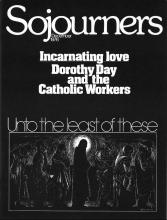This is the fourth and final column in a series on “The Shape of the Church to Come.” When this article appeared, Graham Pulkingham was a contributing editor to Sojourners and one of the leaders of the Community of Celebration in Scotland, an international center for promoting church renewal.
What practical first steps can be taken by leaders at the local level to renew the church as a family community?
First, one can find others who have a like desire for renewal and draw them together as a family. If you are clergy, minimize your professional role and concentrate on being just another of God’s people. Create together a life in which you are all brothers and sisters, in which there is no essential differentiation according to authority, expertise, or role. This is not to say that there are no such differences, but to minimize their importance.
Consider together the meaning of family -- what it is, what it does. It is for raising the young, obviously, and for perpetuating traditions (i.e., for carrying on the “community” life). Its task is to create a peaceful, comfortable, loving environment where needs are readily met.
Extended family has to do with deeply committing yourself and your nuclear family to a larger group of people and together becoming a single social unit. It does not necessarily mean living under the same roof. There are often problems when families try to live together in cramped quarters. It is better to invite single people into your homes, if you will.
Extended family has to do with sharing: learn to share your finances, your families, your concerns, your lives. Create together a community that can run parallel to the institutional church. With care, you can live the life of the people of God without offending the official institution or compromising its integrity.
Read the Full Article
